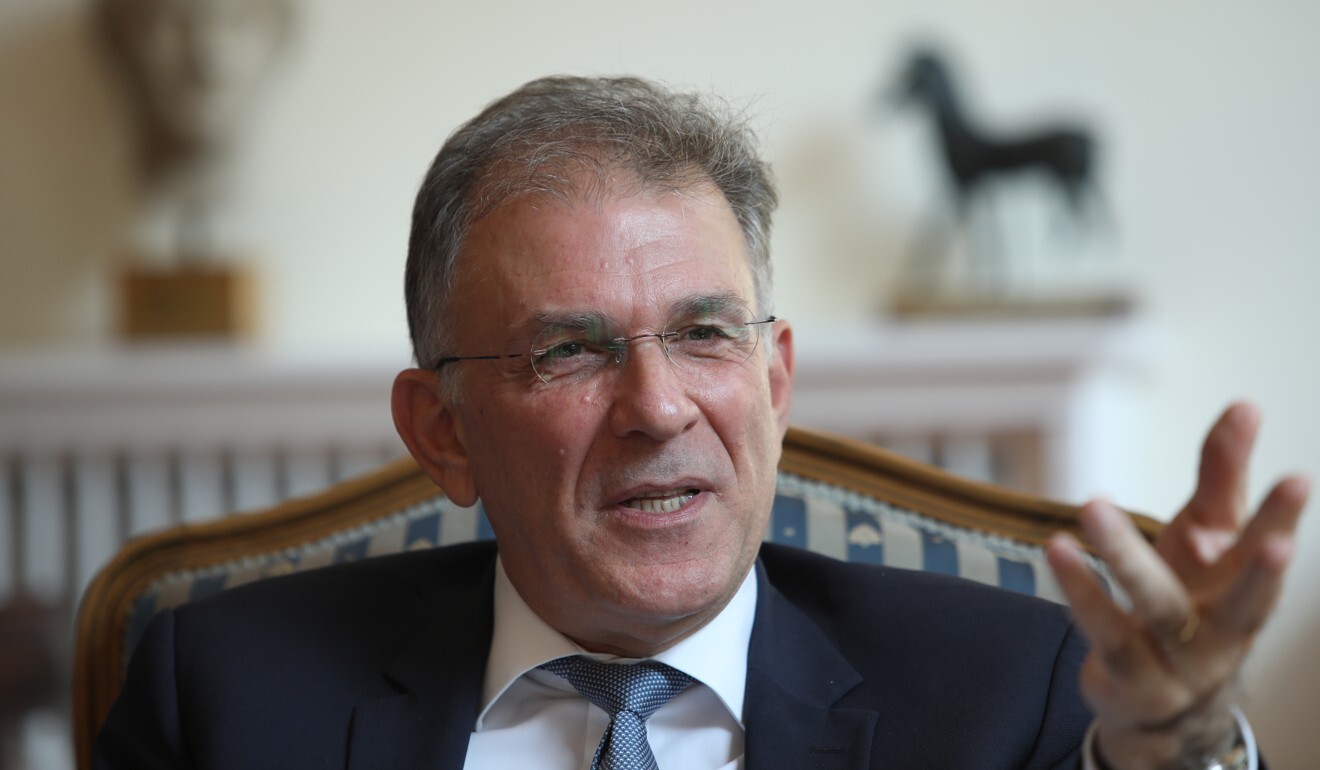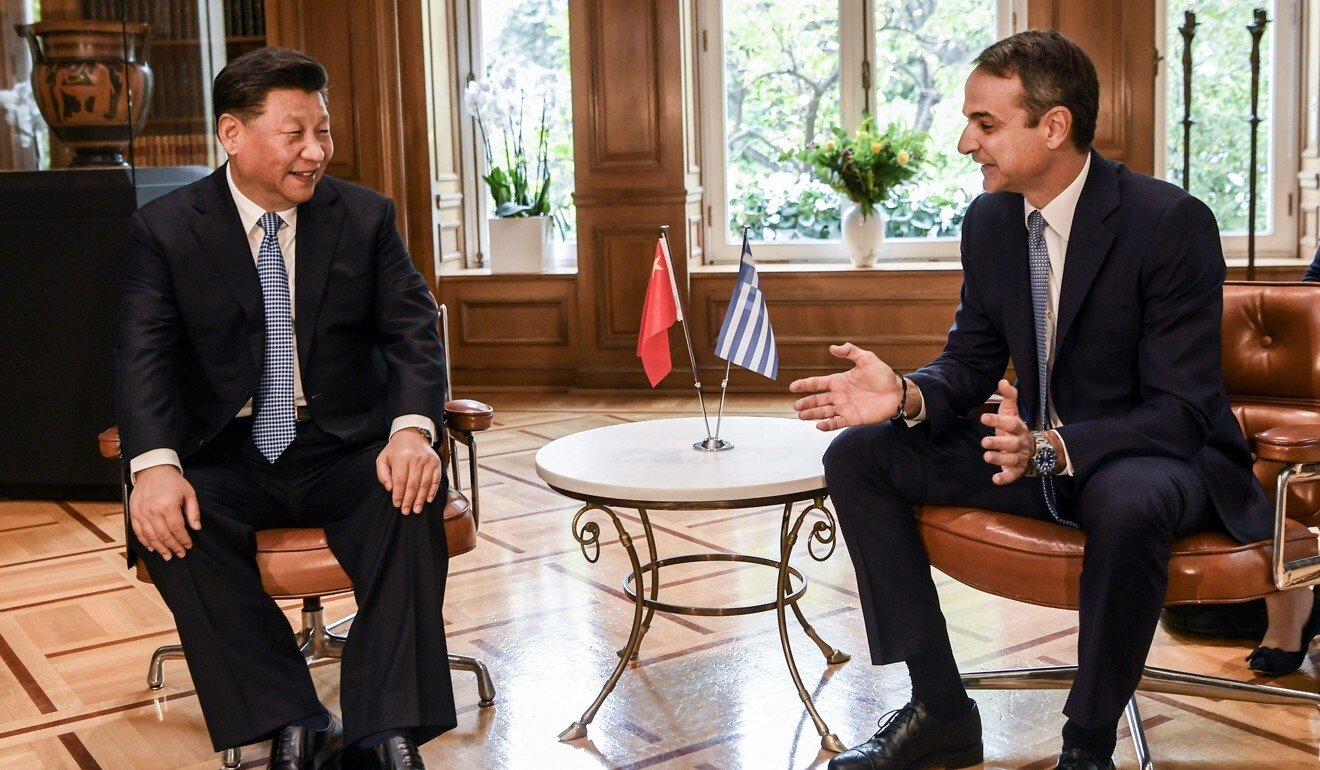
Greece still sees China as more of a partner than a rival, ambassador to Beijing says
- Georgios Iliopoulos says that Athens still wants to focus on cooperation with Beijing, which is a key investor in the port of Piraeus
- EU is taking a tougher approach to China, which it has described as a ‘systemic rival’, but diplomat says bloc does not want antagonism
Greece sees China as a partner, the country’s ambassador in Beijing has said, despite the EU’s description of it as a “systemic rival”.
Georgios Iliopoulos, who arrived in China in December, said the European Union does not want to be caught in the crossfire of the spiralling rivalry between China and the US, adding that the world should accept China’s rise and its quest for a bigger role on the world stage.
But the EU has taken an increasingly tough stance towards China and last year included the description of it as a systemic rival in a policy document that also described it as an “economic competitor”.
But Iliopoulos said the EU does not want to be antagonistic to China and that Greece still considers China – which is working with it to develop the port of Piraeus – as a partner.
“We prefer not to focus too much on [the notion of rivalry or competition], and we prefer to focus on the partnership and the cooperation part,” the Greek diplomat told the South China Morning Post.
“In Greece, we have found that we can work with China,” he said.
“And our approach is to strengthen the partnership dimension of our relations with China, and in essence every country is partnering with China.”

Greece, an important gateway for China into Europe, is trying to balance its loyalty to the transatlantic alliance and its pursuit of commercial ties with China.
In July, US Secretary of State Mike Pompeo announced that Greece has joined the Clean Network, a US initiative to ban Chinese technology from telecommunications and internet infrastructure.
But Iliopoulos said: “We are a EU member. The EU does not wish to find itself in the crossfire of others,” adding that Greece’s participation in the Clean Network initiative does not mean it will exclude all Chinese network providers.
“We will adhere to European Commission guidelines on 5G. Our process is an open one. We don’t exclude anybody, as long as their solutions are within the framework foreseen by the European Commission. Greece is a free economy and the telecommunications providers are private companies.”
Top Chinese diplomat Yang Jiechi to visit Greece and Spain this week
The European Commission in January issued its guidelines on 5G that calls on member states to secure their 5G networks and restrict suppliers considered to be “high risk”.
The guidelines do not name any companies, but the US has warned the Chinese tech giant Huawei is a security risk and a number of its allies have banned it from their 5G networks.
Athens and Beijing have deepened their links since Greece’s financial crisis in 2009. Chinese state-owned shipping company Cosco won a 35-year concession that year to upgrade and run container cargo piers in Piraeus.
Cosco went on to buy a majority 51 per cent stake in the Aegean port in 2016.
During Chinese President Xi Jinping’s visit to Athens in November 2019, the Chinese leader and Greece’s Prime Minister Kyriakos Mitsotakis announced that Cosco would invest about €600 million ($660 million) to develop Piraeus further and transform it into the biggest transit hub between Europe and Asia, as it seeks to overtake Rotterdam in the Netherlands to become Europe’s biggest port.
Piraeus has been seen as one of the most successful projects in the Belt and Road initiative – an ambitious infrastructure push to connect Asia, Africa and Europe – at a time when such investment has come under increasing scrutiny over concerns of debt traps and geopolitical power grabs.

“We have to remember that it was a period when Greece was suffering from a financial crisis and many foreign investors were very hesitant to invest in Greece. And China did … It was, on China’s part, a vote of confidence,” said Iliopoulos.
“Cosco invested in the port when nobody was investing. To those that criticise Greece for partnering with Cosco to make this port bigger and much more successful than it was, my answer is that the privatisation process was an open one, everybody had the right to bid. Not everyone did.”
Why Xi Jinping drew on Greece’s ancient past to forge future ties with China
Cosco plans to build a new container terminal that will have the largest capacity in Europe, along with a shopping centre that is also expected to generate new jobs.
The Greek envoy said his country also hopes to attract more Chinese investment in other sectors and market its food products to China’s growing middle class.
“We would like to see more Chinese investments of course in other sectors such as the primary sector, agri-foods, and also in the secondary sector, in industry, as well as in creative industries – audiovisual productions and film making etc – as well as investment in tourism infrastructure,” Iliopoulos said.

But China’s closer ties with Greece and its expanding influence across the continent have come under increasing international scrutiny.
In 2017, Athens reportedly blocked an EU statement at the United Nations criticising China’s human rights record.
In July, Greece was among the few EU members that resisted tough measures against China in response to Beijing’s imposition of a sweeping national security law in Hong Kong.
Their ties became even closer last year when Greece joined the “16+1” grouping between China and Eastern and Central European nations that includes both EU and non-EU countries.
Iliopoulos said criticism that this grouping will undermine the EU’s unity is “misplaced” and that the 17+1, as it is now known, should be seen as “ a tool and a bridge between China and the EU”.
Xi Jinping hails Greece deals as model for Chinese cooperation with Europe
“The 17+1 partners are members of the EU or aspiring to become members of the EU and no country in principle will carry out policies harming the EU,” he said.
“China has risen as a country in terms of growth and has become much stronger. An increased role by China in the international arena should be expected and considered logical. Everybody should more or less accept that this would be the case,” the ambassador continued.
Iliopoulos said China, as a rising power and a signatory of the United Nations Convention on the Law of the Sea, should assume a bigger role in promoting rule of law amid the maritime disputes between Greece and Turkey in the eastern Mediterranean, one of the Belt and Road Initiative’s trade routes.
Tensions flared between Athens and Ankara in August when Turkey sent a research vessel escorted by war ships to survey the waters of the Greek island of Kastellorizo, an area potentially rich in natural gas.
Greece claims sovereignty over the waters around Kastellorizo but Turkey rejects this and claims that it is on the Turkish continental shelf.
“The only thing that needs to be discussed with Turkey is the delimitation of maritime zones and the continental shelf; but any discussion has to take place according to international law and not under threat or at gunpoint,” said Iliopoulos.
“We all want a China that is benevolent force, a force for good, a force that will help solve problems … and In the end, it’s up to China to decide what role it wants to play.”

